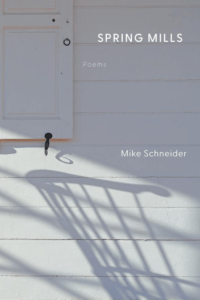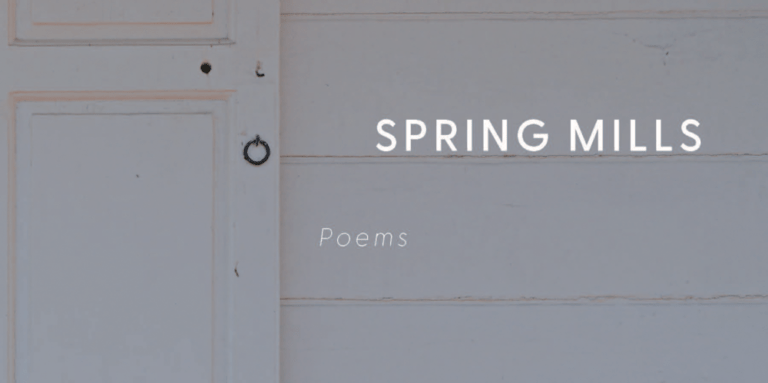“On reading Mike Schneider’s Spring Mills, I can’t get past one word — it’s all I can say, and it’s enough. Wonderful.” —Arlene Weiner, author of More
About the Author: Mike Schneider began writing during the Vietnam War when, while serving at an air force base in Ohio, he published an anti-war “underground” newspaper. He has practiced law, worked as a science writer, won awards for magazine writing, and written book reviews and essays on culture for several publications. For a series of essays on art & politics in the Thomas Merton Center’s New People, he received a 2003-04 Creative Artists Stipend in Arts Commentary from the Pennsylvania Council on the Arts. Three times nominated for the Pushcart Prize, his poems appear in many literary journals, several anthologies and three chapbooks. He received the 2012 Editors Award from The Florida Review and the 2016 Robert Phillips Prize from Texas Review Press. In 2017, for the Lifelong Learning program at Carnegie Mellon University, he taught the first course on Bob Dylan in Pittsburgh. Recently, the Hungry Hill Writing Group in West Cork, Ireland awarded Schneider’s work second prize in its Poets Meet Politics 2022 International Open. His full-length collection Spring Mills (Ragged Sky Press) came out in 2023. He lives in Pittsburgh’s historic South Side neighborhood.
More info From the Publisher: Spring Mills, a small town in rural, central Pennsylvania, becomes in these poems by Mike Schneider a gathering place for four generations of a family over a century of time. Schneider takes readers to where a grandfather recalls using a hand-crank to start his Model T—“shining image of youth & freedom”—and Guernseys in a pasture bellow to be fed. Readers learn how father and son form links in a chain of “manual transmission, / hands-on sequenced pattern of the letter H,” and the poet’s sonic facility opens our ears to the “metallic / industrial click / of shifting gears.” With these poems, we also go to where physicists search among what’s “fizzy out there in the universe”—not only for elusive cosmological “dark matter” but also to hear our inner voices, human “dark matter.” In “Once Upon a Time,” a remarkable marriage of poetry with skilled science writing, the Big Bang is an “unfolding like a rose in bloom” and “Love is evolution of the cosmos. What else can we do?”—a thought the poem answers with longing for, perhaps, a simpler time, a Spring Mills of “Summer evening quietness. A breeze. / The big tree across the street. / Everything made sense.”
Spring Mills
Memorial Day, 1943
 At 17 my father had a silver cornet
At 17 my father had a silver cornet
& blue light stirred behind his eyes.
He stepped out behind the slide trombones,
march tempo, six abreast, six pair of spats
sparkling white on spit-shine Sunday shoes —
row on row of legs draped in royal blue,
striped with gold, 120 steps a minute
to the rattle of the snare down Main Street.
The music is proud Sousa & my father
swells with breath beneath brass buttons,
mouthpiece pressed to lips, triple-tonguing,
double forte. Bright notes burst into the air
of crystalline afternoon, lilac-scented spring.
In from the fields on holiday,
a corridor of eyes & smiles, scrubbed
faces framed in white collars, calloused
hands clapping as the band steps by —
These kids sound good, don’t they?
His silver horn sings outlegato
over Penn’s Creek where it curves
under the wobbly footbridge by the firehall.
Stars & stripes ripple from the flagpole
at the Post Office. An old willow leans
over the water, strand after strand of green
tears. A red-winged blackbird screeches,
lifts into the breeze, epaulets flashing scarlet
as it flaps across the creek to the ballfield
like a young man crossing the sea to war.
Sleeplessness
goes round & round the empty
space in my skull like skittery small
creatures. They scurry
in run-on sentences
made of hungry verbs. Their tiny jaws gnaw
each granule of time, only to find
vacancy, no way
to fall through the hayhole in the windy barn
of sleep. Across the hall
a five-year-old cries out
from his dream of monsters. His mother, beside me
sighs. Like a millwheel
slowly pulverizing, stone
on stone, thoughts to powder, night swallows
day. From the mossy
bottom of a well, a voice
burbles up to say I am a heliotrope. Firmly,
as if I should know this
about myself. Sleep, a black
limousine, waits to enfold me while sleeplessness
jangles its old-time gangster
jazz — alert, cold desire. Inside
the long sedan’s tinted windows, I see faces, sly
smiles as they joke about sin.
that keeps us awake. Grace,
grace, who hasn’t fallen from grace? says the whole
high-school cheerleading squad.
Ready or not, here I come, says tomorrow.
The Trouble with Love
The trouble with love,
says a friend of mine,
is you give it an inch
it takes you dancing,
takes you to lunch
& the cleaners, takes you
where your mother said
Don’t go. And your father
went & came home
begging forgiveness.
The trouble with love
is ice cracks, Earth
howls when love arrives
like a crocus in spring
if it could cry with joy
as it heaves toward light.
Open the windows. Love
is the best drug there is.
The trouble with love
is hit the road Jack.
You’re an empty sack.
To be alive is to lose
the world like Bonaparte,
alone on that high shelf
of the fire escape
where you look down
at your feet. And think
the trouble with love
is a wild white flag, deer
in a distant snowfield,
flashing, gone, bloodhound
sniffing a scorched trail
into the tangled heartland
where there is no trail, blue
hole in a cold blue sky.
Under a flat stone, you find
a note you once wrote to yourself.
It says, The trouble with love.
These poems are published here courtesy of the author and publisher and should not be reprinted without permission.

























